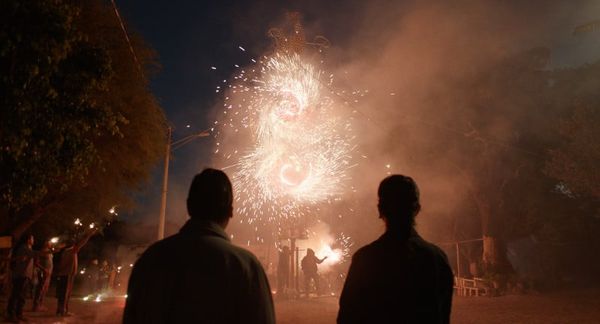Eye For Film >> Movies >> Dos Estaciones (2022) Film Review
Dos Estaciones
Reviewed by: Amber Wilkinson

Juan Pablo González’s background as a documentarian and a cinematographer are in evidence in his fiction feature debut in both the measured approach and careful framing he takes to his story. His slow-build character study is as enjoyable for its small but frequent visual pleasures as it is for its gradually unfolding plot. We don’t meet businesswoman María García (Teresa Sánchez) straight away, instead being introduced to her tequila business by the hard work that is going on in her fields, harvesting agave plants. The physical exertion and skill needed to chop the leaves off each one as they are cut from the land is evident in every move the workers make. There’s talk of a ‘plague’ on another farm, the first hint of an environment that is shifting and a nod to the minor key in which the rest of the story will unfold.
García herself may be fully embroiled in the business, but she is a woman who stands alone for much of the film, running her empire solo but with stoicism, while also facing threats from multinationals who are slowly squeezing her out of the market. González lets her hold our focus, as we watch her eating dinner alone, having her hair done by her long-time hairdresser (non-professional Tatín Vera) and wandering through the factory, where we are treated to the absorbing visuals of how the bottling plant works. With its open space and stained glass on some windows, there’s a church-like feel to the place. García treats the factory with a similar reverence and, in turn, is something of a Mother Superior to her workers, who come to her for this and that, understanding that she can't pay them a full wage. The score from Carmina Escobar also comes into its own there, where choral music that is just teasing at the fringes of dissonant, adds to the mood.

While the framing of cinematographer Gerardo Guerra has a steady calm, González uses every inch of it from side to side and top to bottom to such a consummate degree that even the subtitles have to make way at one point. At another juncture, the frame closes in, courtesy of being shot through a doorway, to emphasise a moment of intimacy. And while the pace remains steady, the director syncopates the rhythms we see within the frame - sometimes we settle into the regulated movements of the bottling plant or watch while García make her way across a patch of landscape dwarfed by nature, while at others, the director embroils us in the mayhem of a fireworks fiesta or a children’s party. It’s at this latter event that García meets Rafaela Fuentes (played by a non-professional of the same name, who articulates a version of herself), a competent office worker who becomes García’s right-hand woman with the hint of something more hanging, like static in the air.
González and his co-writers Ilana Coleman and Ana Isabel Fernández treat emotions with a delicate touch, helped enormously by the editing from González and Lívia Serpa, which seems to hold a shot just long enough for a feeling or connection to fully play out, or cuts to close up to tremendous affect. Sánchez, who won a Special Jury Prize at Sundance, for her work, for the most part reins things up but there’s a glorious sense of her periodically letting García’s emotions off the hook, not least when she has a moment of unadulterated joy spinning donuts in a car. González is from the Jalisco Highlands where this film his shot and his love and knowledge of the place are etched in every frame. Like García’s tequila, this feels locally crafted and, as such, it has an authentic flavour that invites you to savour every moment.
Reviewed on: 11 Aug 2022















